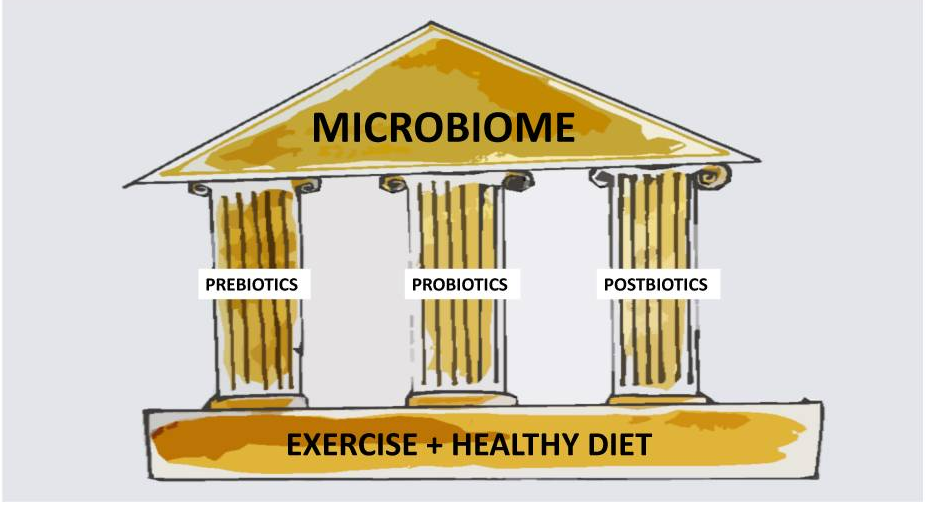Another -biotic?! Here’s the Scoop on Postbiotics
This article was written by Gutivate Team Dietitian, Brittany Durant RDN.
Perhaps you have heard of, or even currently take, a probiotic supplement. The word “prebiotics” might sound familiar, too. But have you heard of the latest -biotic, postbiotics? Current research suggests these compounds derived from fermented foods may provide beneficial effects for your gut and overall health! In this post, we’ll review pre- and probiotics, introduce postbiotics, discuss the current research on their potential health benefits and more.
Probiotics, Prebiotics and Postbiotics
Probiotics are beneficial bacteria, or live microorganisms, that can provide therapeutic or preventative health benefits when ingested in an adequate amount. They have been around for about 100 years or so, so you’ve likely heard a thing or two about them by now. Probiotics exist in your body naturally as part of your gut microbiome. They can also be found in some foods such as yogurt, and many brands offer probiotic supplements, with varying strains and amounts of bacteria provided. Probiotics can have different effects in the body, and different strands of these beneficial bacteria may act in different ways. Some of the positive effects probiotics may provide include promoting healthy diversity of bacteria in the gut, producing byproducts such as postbiotics that are thought to have beneficial effects in the body, and positively influencing the body’s immune response.
Since probiotics are living microorganisms, they require food to feed off of and stay alive. Cue prebiotics. Essentially, prebiotics feed the probiotics. Prebiotics can be defined as “selectively fermented ingredients that result in specific changes, in the composition and/or activity of the gastrointestinal microbiota, thus conferring benefit(s) upon host health.” These selectively fermented ingredients are often consumed in the form of dietary fiber. Common sources include onions, leeks, honey, bananas, artichoke, soybeans, and chicory root. You can also take a prebiotic supplement, such as psyllium or partially hydrolyzed guar gum (PHGG). Read more about fiber supplementation, specifically for IBS, here!
Last, we have postbiotics. After the probiotics feed off the prebiotics, they produce byproducts from this fermentation process called postbiotics. The term “postbiotics” is an umbrella term used to describe any of the substances created during or produced by the bacterial fermentation process in the gut, which directly or indirectly benefit the host (humans). Postbiotics include short chain fatty acids, metabolites, functional proteins and more. These byproducts are formed in the body naturally as part of the digestion process. Recent research suggests these byproducts may promote health in ways similar to pre- and probiotics.
Although postbiotics are created in the body naturally, companies have also begun to develop postbiotic supplements. Unlike probiotics, postbiotics do not contain any live microorganisms, so there may be minimal risks associated with their consumption. This is beneficial for high-risk populations that might have avoided using a probiotic supplement in fear of introducing additional bacteria to their system. Additionally, since postbiotics do not contain live organisms, the production and storage of these supplements is much less costly and intricate in comparison to probiotics. Read on to learn about what the current research shows for postbiotic supplementation.
Want to learn more about IBS? Sign up for a free IBS mini course here!
The Research on Postbiotics
As with any new area of study, the research regarding postbiotics’ effectiveness to prevent and/or treat various diseases remains inconclusive. The exact mechanisms by which postbiotics could produce their effects is still unclear. However, a meta-analysis by Żółkiewicz et al. suggests they may provide a multitude of health benefits including enhanced intestinal barrier function, anti-tumor and anti-inflammatory effects, reducing symptoms of IBS, immune system support and protection from developing certain immune disorders, improvement in the gut microbiota composition and function, assisting in glucose homeostasis, and others. Here is a brief summary of a few of the studies the meta-analysis reviews:
Immune System Support: One study looked at the postbiotics isolated from the probiotic bacterial strain Bacillus coagulans and found that they induce anti-inflammatory cytokine production and promote immune responses. It is important to keep in mind this study was performed in vitro, meaning the bacteria were analyzed in a test tube, not within the human body.
Inflammation/Anti-Cancer: Since inflammation has been linked with cancer, a substance that reduces or prevents inflammation may have anti-cancer properties. In this study, the short-chain fatty acid propionate (a postbiotic produced by the Propionibacterium freudenreichii bacteria) was shown to kill human gastric cancer cells. Although they were human cells, this study was performed in cultured cells and the reactions took place outside of the human body. More research is needed to support the effectiveness within the human body.
Infection Prevention: In a randomized clinical trial of 377 healthy daycare children ages 12–48 months, it was shown that daily consumption of cow’s milk (group A) or rice (group B) containing the L. paracasei postbiotic led to reductions in common infectious diseases. The main outcome of the study was the proportion of children who experienced at least one CID. The proportion of children presenting with upper respiratory tract infections and acute gastroenteritis were lower for both A and B groups, compared to group C (control).
While the current studies can be promising, more human trials are necessary to support postbiotic effectiveness and the health claims associated with them.
Can I Increase The Amount of Postbiotics In My Body?
As previously mentioned, postbiotics are available in supplement form at certain health stores. They are generally regarded as safe in healthy populations, but again, research is still out regarding their effectiveness. A more promising option, based on our current evidence, is to increase the amount of prebiotic and probiotic-rich foods you’re consuming, since postbiotics are the byproducts of probiotic fermentation of prebiotic foods. Probiotic-rich foods include fermented foods and drinks such as:
Tempeh
Kefir
Kombucha
Miso
Yogurt
Sourdough bread
Kimchi
Sauerkraut
We strongly encourage you to talk with a health care provider before beginning any supplements. If you are an immunocompromised individual or have other underlying health conditions, it is wise to talk with your provider before increasing the amount of probiotic-rich foods in your diet as well.
Working with a registered dietitian is a great way to improve the quality of your diet to support your gut, with your specific needs in mind. If you’re interested in working with a dietitian at Gutivate, schedule a consult call here.
Final Words of Wisdom
I’ve included the picture below to serve as a friendly reminder that the -biotics play a very important role in your microbiome and overall health, but they are not the only pieces to the puzzle. Please do not get too caught up in all the science and supplements and forget about those foundational pieces - a well-balanced and nutritious diet, daily movement, good sleep hygiene, stress management, etc. We are always here to chat if you have any additional questions!
Photo source: https://www.ncbi.nlm.nih.gov/pmc/articles/PMC7468815/
Sources:
https://academic.oup.com/cid/article/46/Supplement_2/S67/277472
https://www.ncbi.nlm.nih.gov/pmc/articles/PMC5390821/
https://www.ncbi.nlm.nih.gov/pmc/articles/PMC7468815/
https://pubmed.ncbi.nlm.nih.gov/32892831/
https://pubmed.ncbi.nlm.nih.gov/32717965/
Do you want clear guidance to manage your IBS so you can feel confident in your body again?




